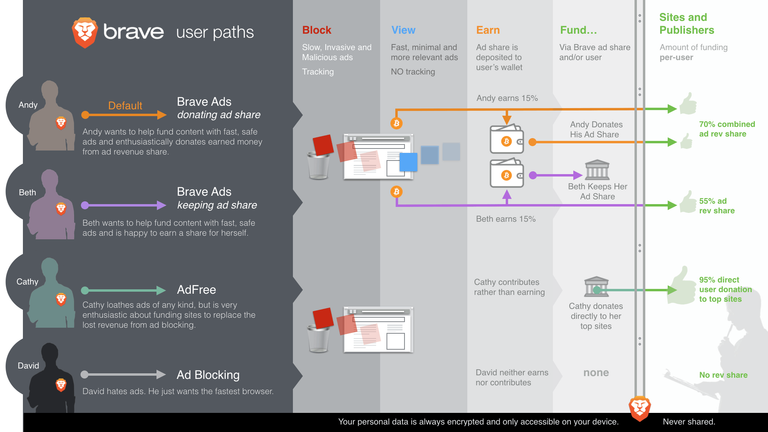This was a big week for Brave, a new open-sourced web browser being built by ex-Mozilla [see Firefox] CEO Brendan Eich.According to Crunchbase,
4.5 Million (USD) was raised in a seed funding round. Investors in the round include Founders Fund’s FF Angel, Propel Venture Partners, Pantera Capital, Foundation Capital, and Digital Currency Group. Along with prior funding, the startup has raised $7 million to date.
Brave sets out to create a faster browser by stripping unwanted content like advertisements and tracking software — and building an ad-block protocol into the browser itself (thus removing the need for third party extensions.)
Brave also hopes to create a ‘safer’ browsing experience for its users — by redirecting all sites through HTTPS (a safer protocol for web communication — cryptographically more secure then the standard http) In addition, Brave also blocks harmful advertising, or “Maladvertising”, where ad display installs malware into your OS through various JavaScript.

Brave Logo Horizontal — via https://www.brave.com/about.html
From their site:
“Annoying ads are yesterday’s news, and cookies stay in your jar where they belong.”
As the applications which allow us to browse the web — browsers play a major role in today’s information economy. While most browsers look relatively similar on the surface (they all include UI elements like the ‘address bar’, ‘forward and back buttons’, and ‘refresh’, for example) each browser takes a slightly different stance on how information on the web is standardized and processed.
An important illustration of this point comes out of Steve Job’s famous essay on Apple’s decision to ban Flash from mobile Safari in 2010, which led to the slow death of Flash Player and its replacement by HTML5 video protocol.
The primary browsers used today are Apple’s Safari, Google’s Chrome, Mozilla’s Firefox, Microsoft’s Internet Explorer (which is transitioning to Edge), and Opera — which has recently become more competitive by offering an easily accessible VPN for iOS)
The market share of today’s browser’s can be seen in the infograph to left. Chrome has witnessed immense growth while Internet Explorer and Firefox have seen a relative decrease in share of usage.While the competition among web browsers is stiff, Brave hopes to set itself apart from the existing collection of Web Browsers by creating a new protocol for the payable web. The long-term goal of this protocol is to allow users to leverage monetary gains from ad-revenue– either through reallocation to promote content creation — or other personal uses.
Ad Share is deposited into the user’s wallet, and may be used to fund publications and content across the web. In this way, Brave protocol can be loosely compared to the self-contained Steemit ecosystem.

Brave ‘User Paths Infographic’ — via www.brave.com/about.html
Of course– users will also have the opportunity to block ads all together– and create a less obtrusive, more focused, browsing experience.Due to Bitcoin’s inherent block-size restrictions, it would make sense for Brave to latch on to an already established machine payment protocol– like 21.co’s open-sourced protocol, for instance
After playing around with a beta version of Brave for almost a month, I have come to appreciate its simplicity and speed of use. While it is currently lacking it the style department — and the web payment protocol is not yet implemented; moving forward, I hope that the full release polishes up the UX, fully implements the payable web, and becomes a major competitor to the other open-sourced browser: — Firefox.In the way that Instagram took on Snapchat’s stories, web browsers have been implementing each others’ features since the creation of the first web browser, Netscape (in 1994) and its rivalry with Internet Explorer.
With the inclusion of ad-black in iOS, Apple has already taken an anti-ad stance. Hopefully, in the future, the major browsers will follow suit and allow users to leverage their time spent viewing ads in order to promote the creation of more highly-valuable web content — and bring this standard to mobile.
Finally, in the long term, regardless of whether or not Brave succeeds, I believe that its feature offerings will eventually be absorbed into mainstream browsers, thus making Brave an important release in the world of Fintech.
I use Brave it is simply an awesome browser :)
Brave is certainly mking waves at the moment, especially among the online advertising industry as the big players there are apparently getting scared. The big question however is if Brave will actually manage to deliver on their promises...
I have tried to share some first impressions from the currently available beta of the browser here, so check the post if you are interested: https://steemit.com/brave/@cryptos/first-impressions-form-the-new-brave-browser-longer-read